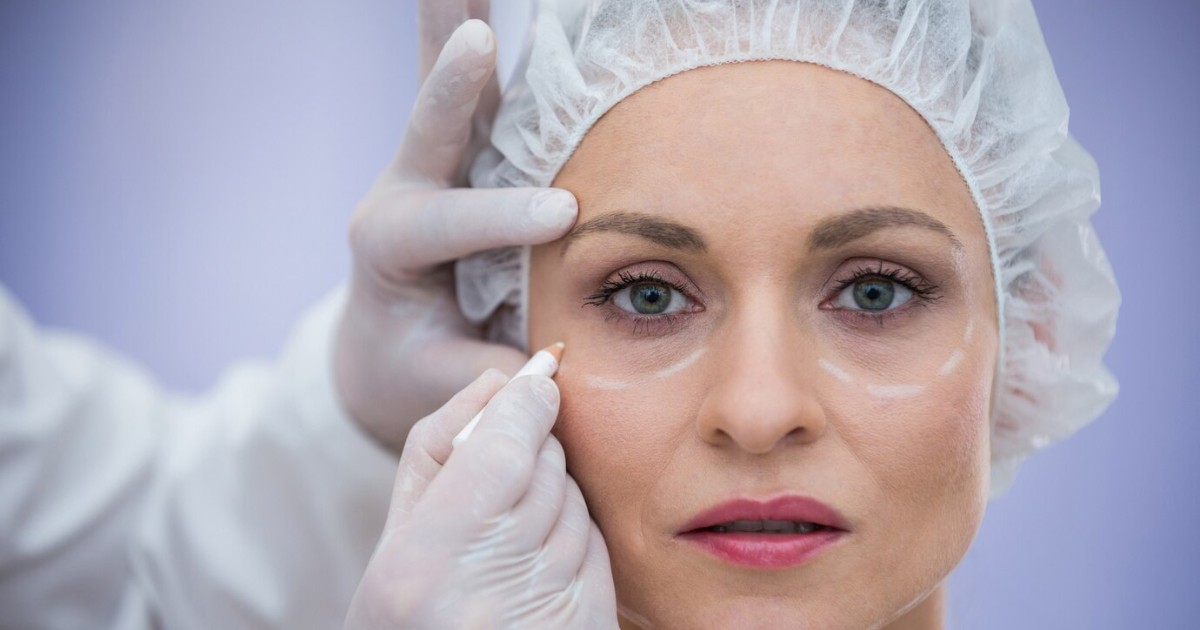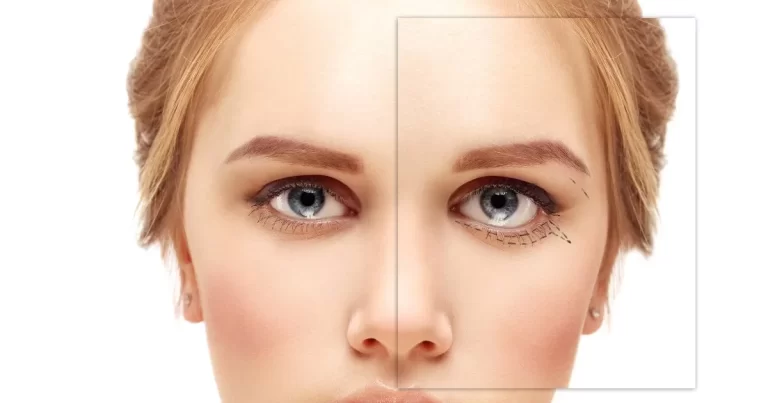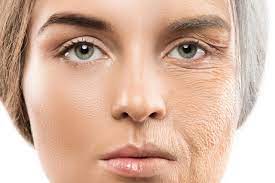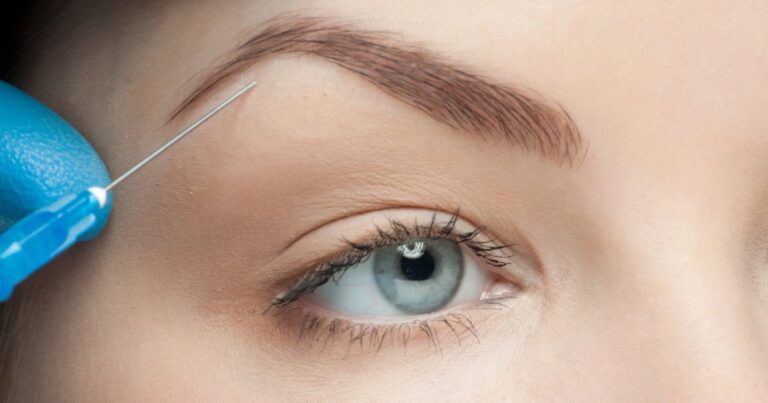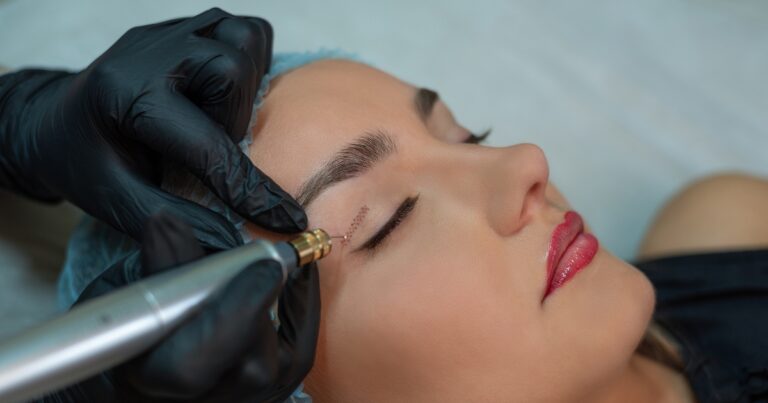Many consider blepharoplasty, or eyelid surgery, for its benefits to vision and appearance. A common concern is, “Can eyelid surgery cause eye problems?” While blepharoplasty is typically safe, it’s not without potential risks to the eyes. Conducting thorough pre-operative assessments and diligently following post-operative care guidelines are essential to reduce complications and ensure healthy recovery.
What Are the Common Eye Problems After Eyelid Surgery?
Post-blepharoplasty, patients may encounter several eye-related issues. These typically include swelling, bruising, and discomfort around the eye area, which are common and usually subside with proper care.
| Issue | Description | Expected Duration | Management Strategy |
| Swelling | Fluid accumulation around the eyes | 1-2 weeks | Cold compresses |
| Bruising | Discoloration due to minor bleeding | 2-3 weeks | Elevation, cold packs |
| Discomfort | Pain around the surgical area | Few days | Pain relievers, rest |
| Temporary Vision Changes | Blurriness due to ointments/swelling | Days to 1 week | Minimal eye strain |
| Light Sensitivity | Increased reaction to light | 1-2 weeks | Sunglasses |
| Watery/Dry Eyes | Changes in tear production | Several weeks | Eye drops |
The table outlines the common eye problems patients might encounter after eyelid surgery, including their descriptions, the expected duration of the issue, management strategies, and their likelihood of occurrence. This provides a quick reference to understand and manage the postoperative recovery phase.
Can Eyelid Surgery Cause Eye Problems or Lead to Dry Eyes?
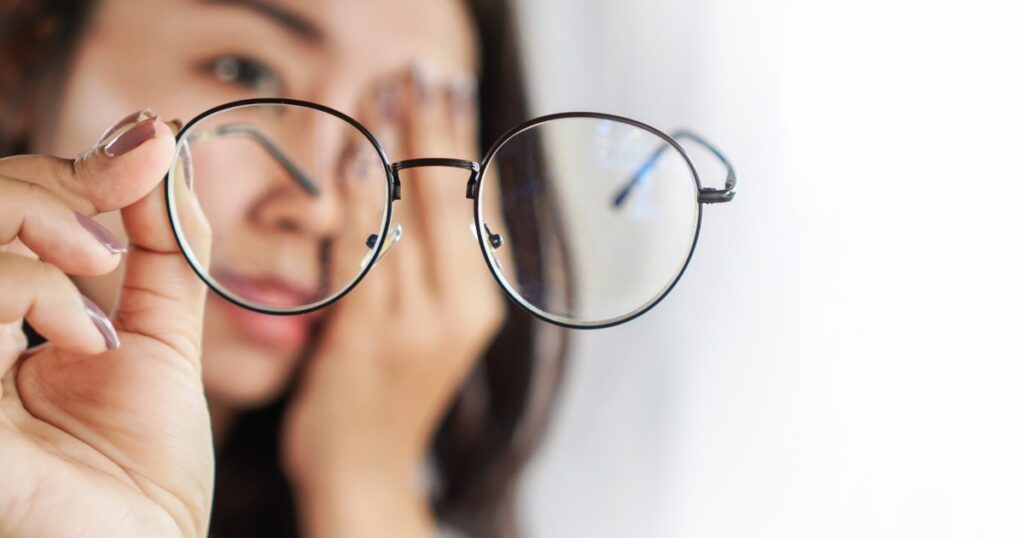
It can indeed result in dry eyes as a potential complication. This condition may emerge due to temporary nerve damage that affects the eye’s natural lubrication mechanism or from alterations to the eyelid’s shape, which can disrupt the protective tear film over the ocular surface. Postoperative inflammation may also contribute to a reduction in tear production or an increase in tear evaporation, leading to dry eye symptoms.
- Alteration of Tear Film– Blepharoplasty can change the eyelid’s contour, potentially leading to inadequate tear distribution across the eye.
- Disruption of Gland Function– The surgery may temporarily affect the glands responsible for tear secretion, decreasing moisture levels in the eyes.
- Post-Surgical Inflammation– Inflammation following eyelid surgery can contribute to dry eye symptoms as the healing process unfolds.
- Nerve Damage– Temporary nerve impairment during the procedure can result in reduced blinking, which is crucial for eye lubrication.
- Exposure Changes– Modifications in eyelid position can increase ocular surface exposure, heightening the risk of dryness.
- Healing Process– The healing period of dry eyes may accompany post-surgery until full recovery is achieved.
- Long-Term Considerations- Some patients may experience prolonged dry eye symptoms, necessitating further medical attention or treatment.
Is Blurred Vision Normal After Eyelid Surgery?
Blurred vision is commonly reported immediately following eyelid surgery, primarily due to ointments and swelling, but it generally resolves as the healing process progresses.
- Ointment Usage- This can leave a temporary film over the eye, causing blurriness.
- Swelling Impact- As swelling subsides, so typically does any associated blurred vision.
- Postoperative Care- Keeping the eyes rested and avoiding strain can help recovery.
- Consult Your Doctor- Persistent blurred vision should be evaluated by a healthcare professional.
- Healing Period– Most patients notice a return to normal vision within a week.
- Monitoring Changes- Any sudden or severe changes in vision should be promptly assessed.
How Can Eyelid Surgery Affect Your Eyesight?
While eyelid surgery is primarily cosmetic, it can temporarily affect eyesight due to swelling and healing. In rare cases, more severe complications could arise, affecting visual acuity.
| Potential Effect | Description | Likely Duration | Management |
| Blurred Vision | Temporary blurriness due to ointments or swelling. | Days to weeks | Usually resolves on its own or with prescribed treatments. |
| Dry Eyes | Reduced tear production can cause visual discomfort. | Weeks to months | Artificial tears or other treatments as recommended. |
| Light Sensitivity | Increased sensitivity to light post-surgery. | Short-term | Sunglasses or temporary avoidance of bright lights. |
| Changes in Vision | Altered eyelid shape may temporarily affect sight. | Variable | Adjustments in visual habits or corrective measures. |
| Visual Field Improvement | Removal of excess skin can improve peripheral vision. | Long-term | Benefits in the field of sight, usually no management needed. |
| Watery Eyes | Reflex tearing due to dryness or irritation. | Weeks to months | Often improve with time or specific treatments. |
The table provides a brief overview of how eyelid surgery (blepharoplasty) can affect eyesight. It encompasses the range of potential visual impacts from the procedure, their duration, and the typical management strategies. This format informs patients what to expect regarding their vision following eyelid surgery and how any changes can be managed postoperatively.
Book A Consultation With Dr Tarek Bayazid
Top-rated Plastic Surgeon For Eyelid Surgery in Dubai
Installment Plan Available
What Complications Can Arise From Blepharoplasty?
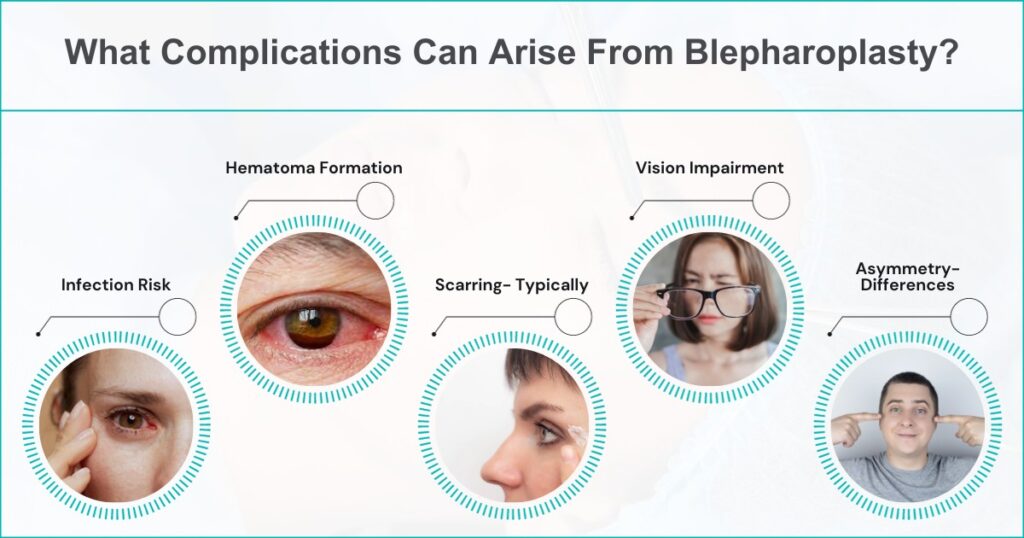
Although eyelid surgery is generally safe, potential complications can include infection, hematoma, scarring, and, at times, more severe issues such as vision impairment.
- Infection Risk- Proper wound care is crucial to prevent infection.
- Hematoma Formation– The surgeon can manage the accumulation of blood under the skin if it occurs.
- Scarring- Typically minimal but can be more pronounced in some patients.
- Vision Impairment- A rare but severe complication that requires immediate medical attention.
- Asymmetry- Differences in the appearance of each eyelid may occur.
- Need for Revision– Some patients might require additional surgery to correct or improve results.
Can Eyelid Surgery Result in Permanent Eye Damage?
Permanent eye damage from eyelid surgery is infrequent. However, as with any surgery, there are inherent risks, and it is essential to choose a qualified, experienced surgeon to minimise complications.
| Risk Factor | Description | Incidence Rate | Prevention Strategy | Management | Prognosis | Surgical Quality Assurance |
| Nerve Damage | Injury to ocular nerves | Very Low | Meticulous technique | Medical treatment | Usually good | Surgeon’s expertise |
| Visual Field Defect | Loss of part of the normal field of view | Rare | Pre-op assessment | Varies | Depends on cause | Pre-surgical planning |
| Persistent Dry Eyes | Chronic eye dryness after surgery | Low | Identify risk factors | Long-term care | Can be managed | Patient screening |
| Inadequate Eye Closure | Inability to close eyes fully | Low | Conservative removal | Therapeutic measures | Often temporary | Surgical restraint |
| Corneal Damage | Injury to the cornea | Extremely Rare | Use of protective shields | Prompt attention | Usually reversible | High surgical standards |
| Tissue Death | Necrosis due to compromised blood flow | Very Rare | Ensure good blood supply | Immediate care | Varies | Careful surgical planning |
The table summarises the risk factors associated with permanent eye damage from eyelid surgery, although most are very rare. It covers descriptions, incidence rates, prevention strategies, management, prognosis, and how surgical quality assurance is pivotal in mitigating these risks.
How Long Do Eye Problems Last After Eyelid Surgery?

Most eye-related issues following eyelid surgery, such as swelling and bruising, improve within weeks. However, complete healing and final results may take several months.
- Initial Recovery- Most visual symptoms improve significantly in the first 1-2 weeks.
- Swelling Duration– Can last several weeks but typically diminishes gradually.
- Bruising Timeline– Usually resolves within 10-14 days post-surgery.
- Long-Term Healing– Final results and resolution of subtle issues may take up to a year.
- Patient Variability– Healing times can vary greatly between individuals.
- Surgeon’s Guidance– Following the specific post-op instructions of your surgeon can aid in recovery.
Can You Develop Infections in Your Eye After Eyelid Surgery?
Infections are a possible complication after any surgical procedure, including eyelid surgery. Adhering to postoperative care instructions is vital to reduce this risk.
- Sterile Technique- Surgeons use sterile methods to minimise infection risk during surgery.
- Antibiotics- These may be prescribed as a preventative measure.
- Signs of Infection- Include increased redness, swelling, and discharge, which require prompt medical attention.
- Wound Care– Proper cleaning and care of the surgical area are crucial.
- Touching Eyes- Should be avoided to prevent contamination.
- Immediate Care- Early treatment of infection can prevent more severe complications.
What Precautions Can Prevent Eye Problems Post-Eyelid Surgery?
Taking proper care before and after eyelid surgery can significantly mitigate the risk of postoperative eye issues. This includes following the surgeon’s recovery protocol and attending all follow-up appointments.
| Precaution | Purpose | Implementation | Duration | Benefit | Patient Responsibility | Surgeon’s Advice |
| Rest | Minimize strain on eyes | Limited activities | First few weeks | Promote healing | Follow guidelines | Provide instructions |
| Cleanliness | Prevent infection | Sterile environment | Post-op period | Reduce complications | Maintain hygiene | Emphasize importance |
| Eye Protection | Shield from trauma | Sunglasses/eye shields | As needed | Safety | Use as directed | Recommend options |
| Medication Compliance | Aid healing, prevent infection | Timely intake | According to prescription | Optimal recovery | Take as prescribed | Clear directions |
| Follow-Up Visits | Monitor healing process | Scheduled check-ups | Regular intervals | Early detection | Keep appointments | Schedule appropriately |
| Avoiding Rubbing Eyes | Protect surgical site | Conscious behaviour | Until fully healed | Prevent irritation | Self-control | Remind of risks |
This table suggests various precautions that can help prevent eye problems after eyelid surgery. It includes the purpose of each precaution, how they should be implemented, their duration and benefits, and the responsibilities of both the patient and the surgeon to ensure a smooth recovery.
Can Eyelid Surgery Lead to Changes in Eye Shape?
Changes to the shape of the eye are possible after eyelid surgery, notably if the skin’s tension is altered. An experienced surgeon can help ensure changes are as intended and symmetrical.
- Surgical Technique– Plays a crucial role in the outcome of eye shape.
- Preoperative Planning– Detailed discussion with the surgeon about the desired results is critical.
- Patient Anatomy- Individual anatomical differences can affect surgical outcomes.
- Healing Process– Changes in eye shape may settle as swelling diminishes.
- Revision Surgery– In some cases, additional surgery may be needed to refine the eye shape.
- – Patients need to have realistic expectations about changes in eye shape.
Is Double Vision a Side Effect of Eyelid Surgery?
Double vision, known medically as diplopia, can be a transient side effect of eyelid surgery. This phenomenon may arise when there is an alteration to the eye muscles or nerves during the procedure or as a result of postoperative swelling. While typically temporary, diplopia should be closely monitored as it can significantly impact daily activities and quality of life.
- Muscle and Nerve Impairment– Manipulation during surgery can affect the muscles and nerves, leading to temporary misalignment of the eyes.
- Swelling- Postoperative swelling can temporarily distort vision, causing double images.
- Haematoma– In rare cases, blood collection beneath the skin after surgery can exert pressure on the eye, leading to double vision.
- Anaesthetic Effects– Residual effects of anaesthesia may also cause transient diplopia until fully metabolised by the body.
- Healing Process- As the eye area heals, shifting tissues may affect eye alignment, potentially resulting in double vision.
- Revision Surgery Impact- Any additional corrective surgeries may alter the eye’s structural balance, risking diplopia.
- Protective Measures- Patients are advised to follow postoperative care instructions diligently to minimise the risk of double vision.
How Does Eyelid Surgery Affect Tear Production?
Eyelid surgery can temporarily affect the tear ducts and alter tear production, leading to either watery eyes or dryness, but these conditions usually resolve as the healing continues.
- Tear Duct Adjustment- Surgery may temporarily disrupt normal tear production.
- Symptom Management– Artificial tears or eye drops may be prescribed to manage symptoms.
- Healing Process- Normal tear production typically resumes as swelling decreases.
- Dry Eye Management- Patients with pre-existing dry eyes may need special attention post-surgery.
- Observation Period- Surgeons often monitor tear production closely during the recovery period.
- Long-term Effects- Permanent changes to tear production are uncommon.
Can Eyelid Surgery Cause Problems with Eye Closure?
Eyelid surgery can sometimes result in complications associated with eye closure. Incomplete eye closure, known as lagophthalmos, may occur if too much skin is removed or due to postoperative scarring and nerve damage. This condition is crucial to address as it can lead to eye discomfort, exposure to keratopathy, and potential damage to the cornea if left untreated.
- Overcorrection During Surgery– Excessive removal of eyelid skin can hinder full eyelid closure.
- Postoperative Scarring– Scar tissue can limit eyelid flexibility, impeding proper closure.
- Nerve Damage– Surgical trauma can affect nerves controlling eyelid movement.
- Swelling- Initial swelling may temporarily prevent the eyelids from closing fully.
- Healing Complications– Complications in the healing process can result in longer-term issues with eyelid closure.
- Revision Surgery Requirements– In some cases, additional surgery may be necessary to correct eyelid closure problems.
- Protective Measures– Ophthalmic ointments and taping the eye closed at night can protect the eye until normal closure is restored.
Eyelid surgery can potentially cause eye problems; the risks are typically low when experienced surgeons perform the surgery. Proper care and following detailed post-surgery instructions can further mitigate these risks. Patients should have comprehensive discussions with their healthcare provider about all potential outcomes to ensure the safety and health of their eyes post-surgery.
For exceptional results in eyelid surgery and facial rejuvenation, Dr. Tarek Bayazid stands as Dubai’s premier plastic surgeon. With a patient-first approach and a mastery of advanced, natural-looking techniques, he ensures your health and beauty are in expert hands.
Book your consultation with Dr. Tarek Bayazid and experience the pinnacle of aesthetic care.
